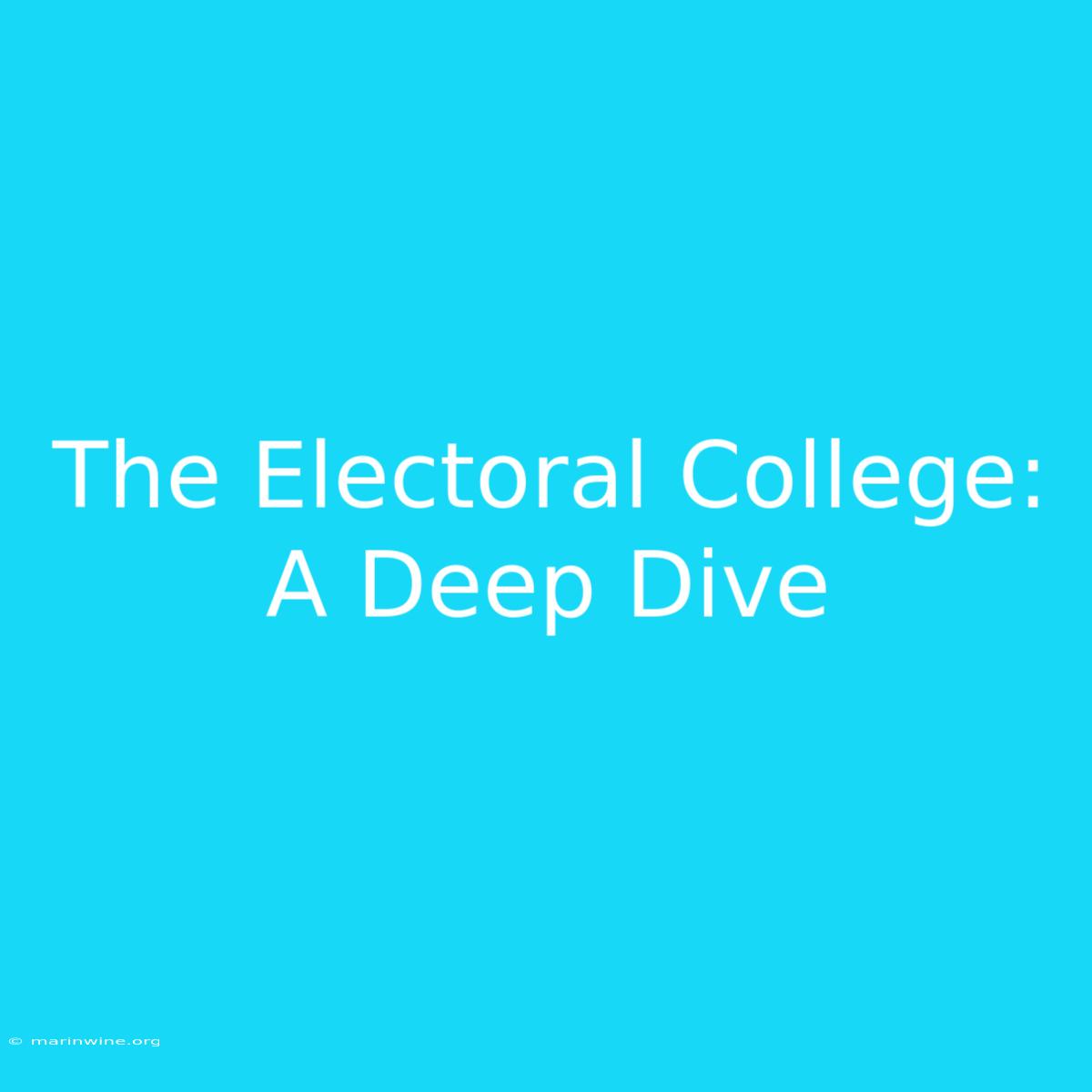The Electoral College: A Deep Dive
Is the Electoral College a fair system? This question has been a source of controversy since its inception, sparking heated debate and raising concerns about its democratic legitimacy.
Why It Matters: The Electoral College is a critical component of the United States presidential election process, determining the winner of the presidency despite the popular vote. Understanding how it works, its historical context, and its potential flaws is essential for informed civic engagement.
Key Takeaways of the Electoral College
| Key Aspect | Description |
|---|---|
| Purpose | To elect the president indirectly, balancing the interests of states with varying populations. |
| Mechanism | Each state is allocated electors based on its congressional representation. |
| Winner Takes All | Except for Maine and Nebraska, the candidate who wins the popular vote in a state wins all its electoral votes. |
| 270 Threshold | A candidate needs at least 270 electoral votes to secure the presidency. |
The Electoral College
The Electoral College was established by the Founding Fathers as a compromise between those who favored direct popular election and those who wanted to give more power to the states. Its primary goal was to ensure that states with smaller populations had a voice in the presidential election.
Key Aspects of the Electoral College:
-
State-Based System: The Electoral College is a state-based system. Each state is allocated a number of electors based on its congressional representation (House Representatives + two Senators). This means that states with larger populations have more electors.
-
Winner Takes All: Except for Maine and Nebraska, the candidate who wins the popular vote in a state wins all its electoral votes. This system, known as "winner-take-all," can lead to situations where a candidate can win the presidency without winning the national popular vote.
-
The Importance of Swing States: Due to the winner-take-all system, campaigns tend to focus their efforts on a limited number of "swing states" that are considered competitive. This often leads to a situation where the concerns of voters in less competitive states are overlooked.
The Debate Over the Electoral College
The Electoral College has been a source of debate for decades, with arguments both for and against its continued use.
Arguments for the Electoral College:
- Ensures Representation of Smaller States: By allocating electors based on congressional representation, the Electoral College gives smaller states more influence in presidential elections. This ensures that the interests of these states are not overlooked.
- Promotes National Unity: The Electoral College encourages candidates to campaign in all regions of the country, fostering national unity and understanding.
- Prevents Tyranny of the Majority: The Electoral College provides a safeguard against a candidate winning the presidency with a narrow majority of the popular vote, potentially undermining the will of a significant portion of the population.
Arguments Against the Electoral College:
- Undemocratic: The Electoral College can result in a candidate winning the presidency without winning the popular vote, which many consider undemocratic.
- Focus on Swing States: The focus on swing states can lead to candidates neglecting the needs of voters in less competitive states.
- Difficult to Understand: The Electoral College system is complex and difficult for many voters to understand, leading to voter apathy and disengagement.
The Potential for Reform
There have been numerous proposals to reform or abolish the Electoral College, including:
- National Popular Vote: This proposal would award the presidency to the candidate who wins the national popular vote, regardless of the outcome in individual states.
- Proportional Allocation of Electoral Votes: This system would allocate electoral votes within a state based on the percentage of votes each candidate receives.
- Direct Popular Election: This option would eliminate the Electoral College entirely, allowing for a direct vote for president by all eligible citizens.
FAQs about the Electoral College
Q: Can a candidate win the presidency without winning the popular vote? A: Yes, this has happened five times in U.S. history, most recently in 2016.
Q: Why is the Electoral College still in use? A: The Electoral College is enshrined in the Constitution, and any changes would require a constitutional amendment, which is a difficult process.
Q: What is the "faithless elector" phenomenon? A: A "faithless elector" is an elector who votes for a different candidate than the one they are pledged to support. This is rare, but it highlights the potential for the Electoral College to produce unexpected results.
Q: What are the potential consequences of abolishing the Electoral College? A: Abolishing the Electoral College could lead to greater national unity, but it could also give more power to large urban areas and potentially diminish the influence of smaller states.
Tips for Understanding the Electoral College
- Research the history and purpose of the Electoral College. This will help you understand the context for its creation and its intended role.
- Learn about the specific rules and procedures of the Electoral College. This will help you understand how the system works and how presidential elections are conducted.
- Familiarize yourself with the arguments for and against the Electoral College. This will enable you to form your own opinion on the system's effectiveness and fairness.
Summary of the Electoral College
The Electoral College is a complex and controversial system that plays a central role in determining the outcome of presidential elections. While it has been criticized for its potential to produce undemocratic results, it also has its defenders who argue that it serves important purposes. The debate over the Electoral College is likely to continue for years to come, and it is important for citizens to be informed about the system and its implications.
Closing Message: Understanding the Electoral College is vital to understanding the intricacies of the U.S. political system. Engaging in informed discussions about its strengths and weaknesses, and advocating for potential reforms, can help ensure a fair and democratic presidential election process.

